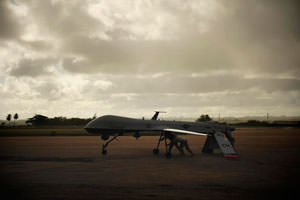Our Robotic Assassins
The skies over at least six countries are patrolled by robotic aircraft, operated by the U.S. military or the CIA, that fire missiles to carry out targeted assassinations. I am convinced that this method of waging war is cost-effective but not that it is moral.
The skies over at least six countries are patrolled by robotic aircraft, operated by the U.S. military or the CIA, that fire missiles to carry out targeted assassinations. I am convinced that this method of waging war is cost-effective but not that it is moral.
There has been virtually no public debate about the expanding use of unmanned drone aircraft as killing machines — not domestically, at least. In the places where drone attacks are taking place, there has understandably been great uproar. And in the rest of the world, questions are being raised about the legal and ethical basis for these antiseptic missile strikes.
According to The Washington Post, a U.S. military drone fired missiles in Somalia last week in an attempt to kill two leaders of the Islamist group al-Shabab, which is tied to al-Qaida. The men apparently were wounded in the attack, the newspaper reported, quoting an unnamed senior military official.
Somalia thus joins Afghanistan, Pakistan, Iraq, Yemen and Libya as nations where remote-controlled drones are conducting lethal attacks. The strike was deemed justified by U.S. officials, according to the Post, because al-Shabab had become “somewhat emboldened of late” and was “planning operations outside of Somalia” against the United States or its allies.
The Obama administration has greatly increased the use of missile-firing drones, and it is easy to understand why. The unmanned aircraft can be flown above hostile territory — and used to locate, track and obliterate a target — without putting U.S. lives at risk. Since the drones are controlled electronically by human operators, they can be directed in ways that respond to changing conditions on the ground: If a fleeing target’s SUV turns right, the drone can turn right, too.
Increased reliance on drone attacks is part of the administration’s long-range counterterrorism strategy. According to the New America Foundation, which tries to keep track, there have been 215 drone attacks in Pakistan alone since January 2009.
Since the program is supposed to be secret, officials use euphemisms when speaking about it publicly. John Brennan, President Obama’s counterterrorism adviser, said in a recent speech that “our best offense won’t always be deploying large armies abroad but delivering targeted, surgical pressure to the groups that threaten us.”
The word “surgical” is used a lot to describe the drone program, although surgery is designed to save lives, not take them.
Why should officials even think twice about using technology that can kill our enemies without putting American lives in harm’s way? Plenty of reasons.
First, there’s the practical question of whether killing terrorists in this manner creates new ones. And in Pakistan, for example, the government has responded to public outrage by banning drone flights from an airfield that previously had been an operational hub, according to The Financial Times.
There is also a legal question. The Obama administration asserts that international law clearly permits the targeting of individuals who are planning attacks against the United States. But this standard requires near-perfect intelligence — that we have identified the right target, that we are certain of the target’s nefarious intentions, that the target is actually inside the house or car that the drone has in its sights. Mistakes are inevitable; accountability is doubtful at best.
Most troubling of all, perhaps, are the moral and philosophical questions. This is a program not of war but of assassination. Clearly, someone like Ayman al-Zawahiri — formerly Osama bin Laden’s second-in-command, and now the leader of al-Qaida — is a legitimate target. But what about others such as the Somali “militants,” who may wish to do us harm but have not actually done so? Are we certain that they actually have the capability of mounting some kind of attack? Absent any overt act, is there a point at which antipathy toward the United States, even hatred, becomes a capital offense?
It is one thing to assassinate known leaders of al-Qaida, a terrorist organization with which we are at war. It is another thing to use drones in Libya, against a regime that posed no threat whatsoever to the United States.
We urgently need to explore these issues, because the use of robotic aircraft — and, surely, robotic devices that operate on land and sea — will inevitably expand as the technology improves. And we need to relearn an ancient lesson: that no method of waging war is without risk or without consequences.
Eugene Robinson’s e-mail address is eugenerobinson(at)washpost.com.
© 2011, Washington Post Writers Group
Your support matters…Independent journalism is under threat and overshadowed by heavily funded mainstream media.
You can help level the playing field. Become a member.
Your tax-deductible contribution keeps us digging beneath the headlines to give you thought-provoking, investigative reporting and analysis that unearths what's really happening- without compromise.
Give today to support our courageous, independent journalists.






You need to be a supporter to comment.
There are currently no responses to this article.
Be the first to respond.